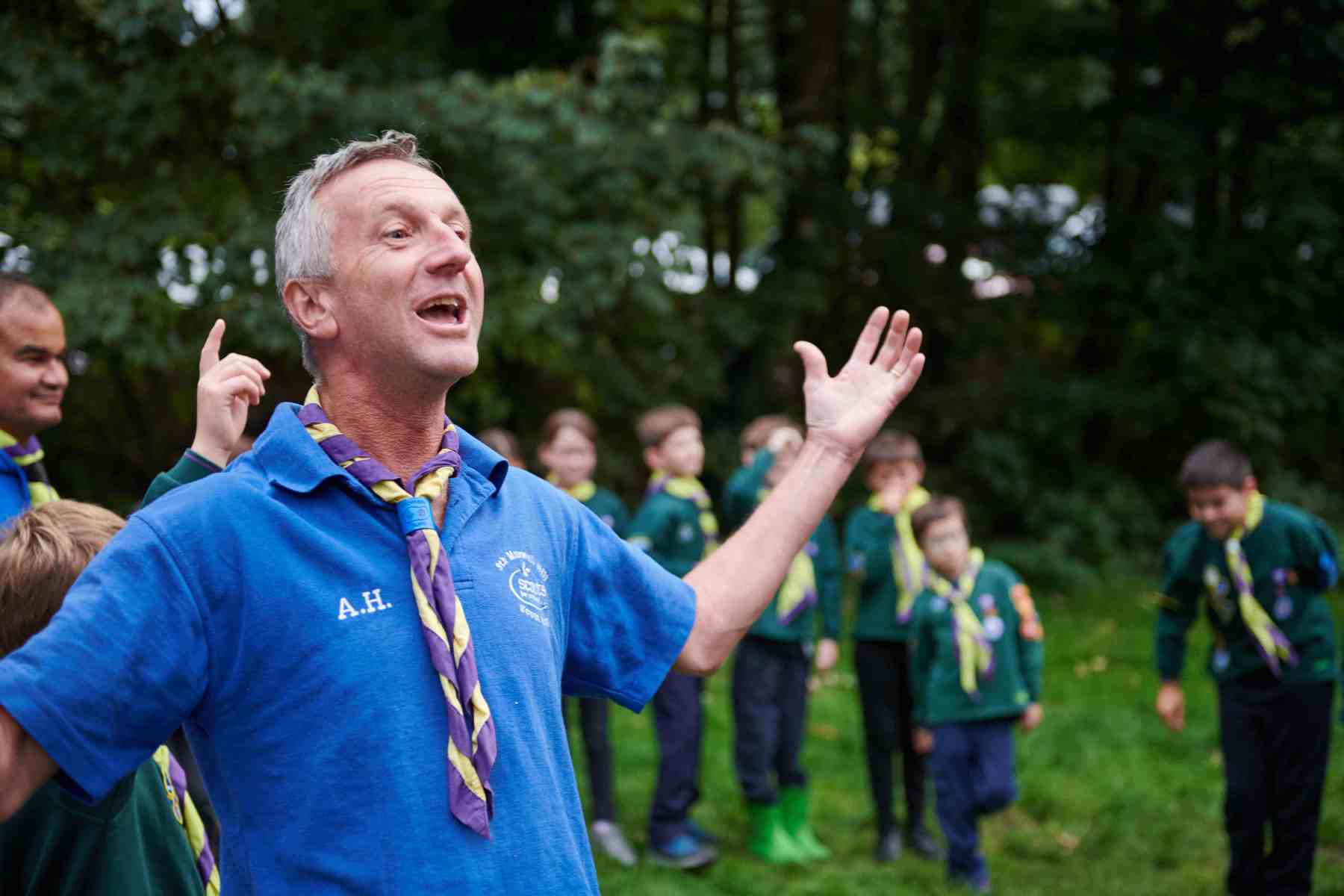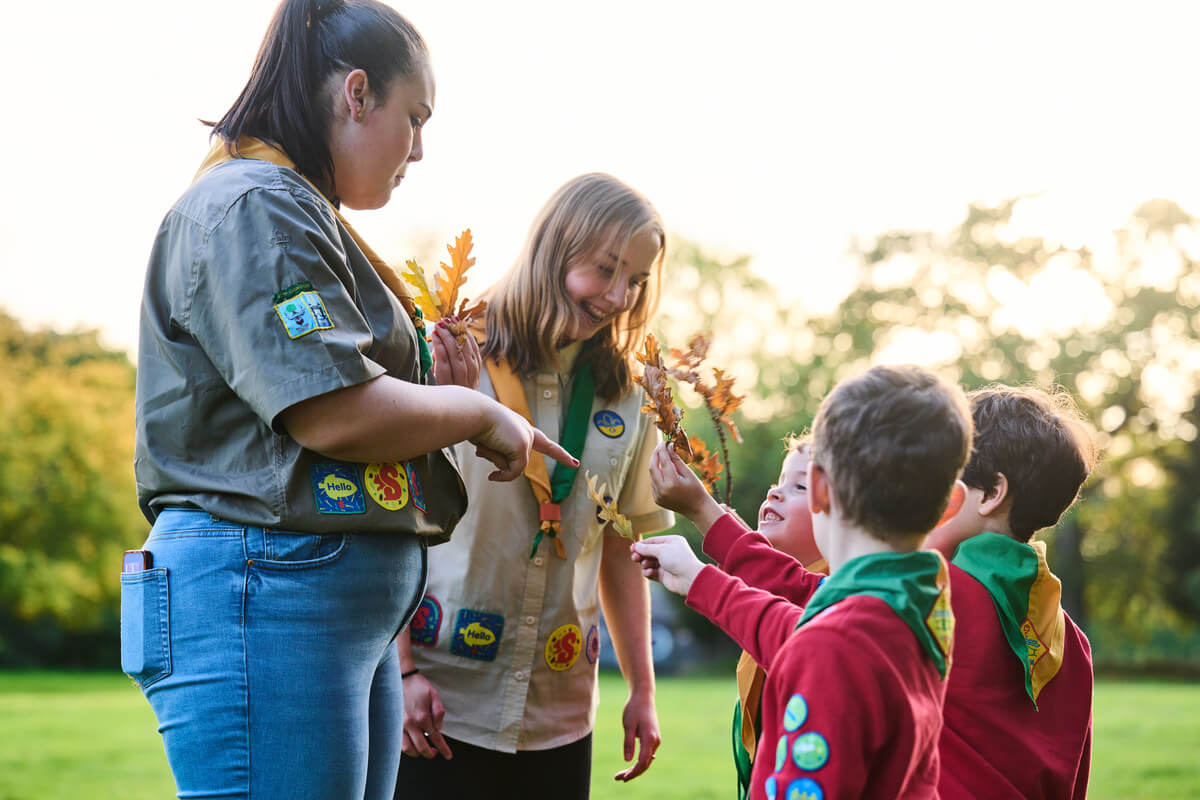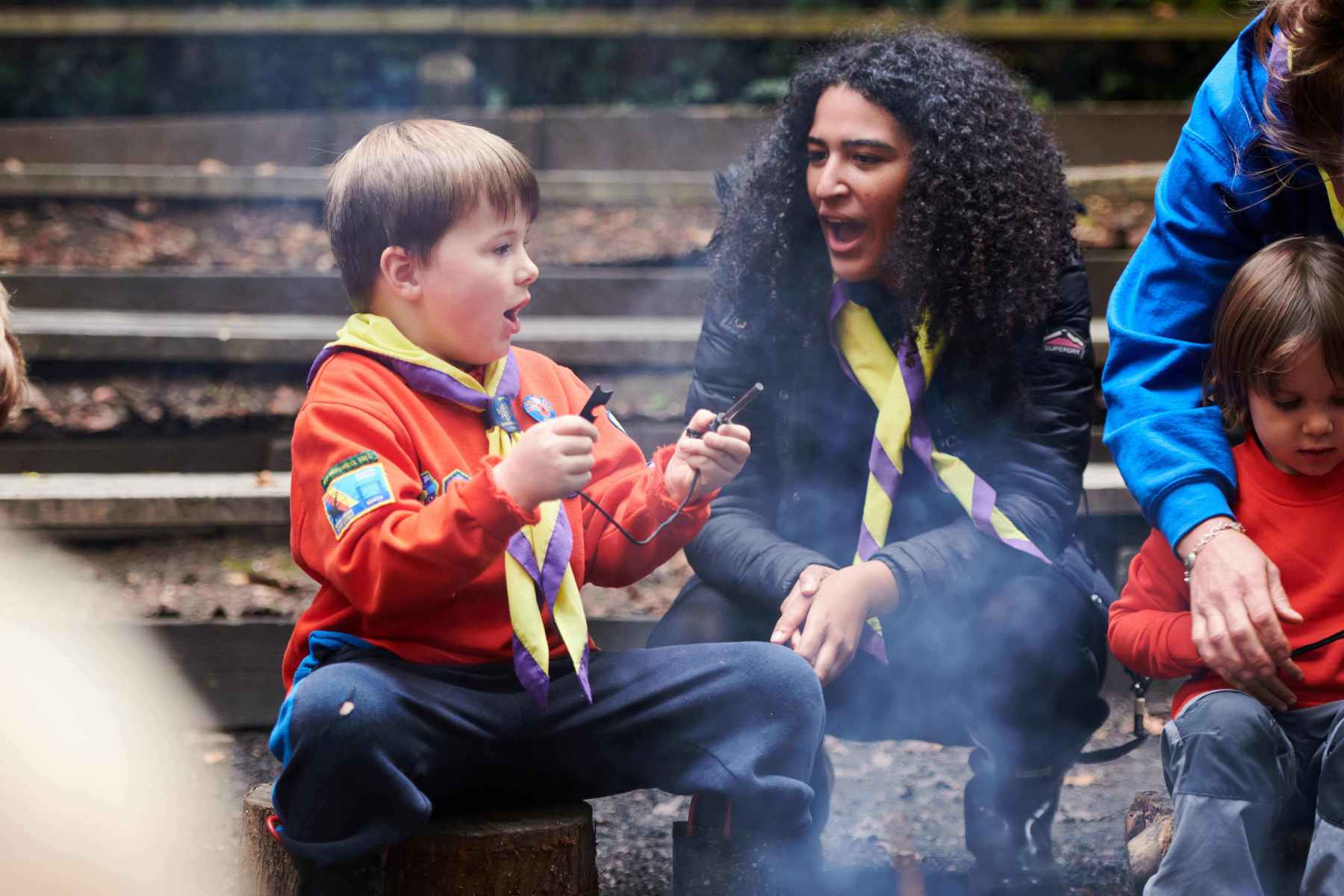Mental Health Awareness Week
Did you know in 2020 Mind reported that 1 in 4 adults and 1 in 10 young people experience a mental health problem?
Mental Health Awareness Week is the 10 to 16 May this year.
Mental health refers to the way we think, feel and act. Everybody has mental health, the same way everybody has physical health, and we all need to look after it.
Mental health can sometimes feel like a complex and intimidating subject. Lots of people, from all backgrounds and of all ages, can experience a mental health problem, so being able to talk about it is important.
There are plenty of things that can negatively impact mental wellbeing for young people and adults, such as a challenging time at work or at school.
Scouts have partnered with Mind (England and Wales), SAMH (Scotland) and Inspire (Ireland) to help support you in running activities to help young people learn about and talk about mental health.

Seven ways to promote good mental health
Connecting with others can help us have a greater sense of belonging and reduce feelings of loneliness. Interacting with people around you, your family, friends and neighbours can really help boost your mood.
You should spend time at Scouts meetings strengthening relationships between your young people and helping them make friends. You might want to run teamwork activities, getting to know you games or have a relaxed board game night for everyone to get chatting.
At Scouts, you could put five minutes aside each week to find out how a member of your group really is, including volunteers. Remember to say thank you, too.
Scouts is a great way to make new friends, too. Remember to make friends with other volunteers, have social events for your volunteer team or organise a volunteer event for your area.
Outside of Scouts, you could check in with, chat to and make increase friendships with existing friends, old friends, neighbours or people in your activity class. See if any of them fancy a walk, chat, volunteering, or doing something fun together to boost the friendship. You could find a new hobby, local community project or group to make friends, too.
Physical activity releases feel-good hormones that make you feel better in yourself, helps manage stress and give you more energy. Keep everyone feeling good by getting active and doing something your group can all enjoy together.
You could go on a walk or hike, go swimming or kayaking, spend some time gardening, organise a bike ride or Pilates class, play Capture the Flag, or have a game of football or rounders.
Why not get parents, carers or the wider district involved in a Sports Day? Even a quick warm up game of Duck, Duck Goose or Captain's Coming will help everyone to feel refreshed at the start of a meeting.
While being active, it's important to remember that drinking enough water is important for your mental and physical health. The NHS has helpful information on how to maintain a balanced diet, too.
Basic self-care and looking after yourself, such as brushing your teeth or having a shower, is important for your physical health and can help you feel better. You could try to remind people of small goals, especially on camp, such as brushing your hair or washing your face.
Mindfulness is a way of paying attention to the present moment. And spending time in green spaces has been found to reduce stress, anxiety and depression.
Become more aware of your surroundings and what is happening right now.
Take a moment to pause, look and listen to what's happening around you.
Follow these steps for a new way to experience your surroundings. This can also be a chance to get some gentle exercise, if you would like to and feel able to.
- Find a green space, go outside or sit by an open window. When you get there, stop for a moment and take a deep breath.
- Start exploring slowly. Try not to focus on getting somewhere in particular. Really focus on any movement you make. If you're walking, notice which part of your foot touches the ground first, and feel the transfer of weight through your foot.
- Notice the ground underneath you. Is it grass or earth? Does the ground feel soft? What colours can you see?
- Think about the rest of your body. How are you holding your arms? Does the air on your face feel cold or warm?
- Listen to the sounds around you. Can you hear birdsong, or wind rustling through the leaves?
In Scouts, you could start with a circle and ask your members to each say something that was good about their day to show gratitude, make cards to say thank you to people, or you could run a meditation or mindfulness session for everyone to slow down and take some time for themselves.
You could run the 5, 4, 3, 2, 1 exercise for Scouts, too. If you're starting to feel stressed, overwhelmed or panicked, connecting with your five senses can help to ground yourself in the present moment. You can do this exercise anywhere and it doesn't need any special equipment.
It goes like this:
- Look around you and notice five things you can see. It could be a pen, a mark on the wall, or someone's shoes. You can name these in your head or out loud, or write them down.
- Name four things you can touch or feel around you. For example, your hair, your nose, the ground under your feet or the air on your skin.
- Name three things you can hear around you. This could be something outside, or your own breathing.
- Name two things you can smell around you. It doesn't have to be a strong smell, and you can take a short walk around to find something if you want to.
- Name one thing you can taste at the moment.
Doing something creative can help distract you from difficult thoughts or feelings, or help you to process them. It can also be rewarding.
You could try doing something creative, such as drawing, playing a musical instrument or baking. Try not to worry about the finished product. Just focus on enjoying yourself.
Learning a new skill in a group can be enjoyable, and help boost your confidence, too. Keep learning new skills or fun facts by trying something different and exploring the world around you. You could find out how to do a magic trick, learn about science or discover how to grow vegetables.
You could complete a badge as a unit that helps to boost your group's knowledge, run a community activity to help develop a sense of pride, or discover ways to increase your young people's self esteem and confidence.
Online learning is a good option if it's difficult to get out and about or you're short on time.
Using your time to help others can give you a sense of purpose, help you meet people and boost your self-esteem. Giving to others is a great way to make yourself feel good too.
Start a community impact project or have everyone volunteer with a local charity. You could even encourage a new volunteer to join you!
Take a look at our activities to help your community.
Spending time in nature outdoors can help improve your mood and reduce feelings of stress and frustration.
You could have lunch outside, go for a walk, build a wildlife home or explore a local park. You could try gardening or bird-watching, or you might want to take it a step further and try cycling, hiking or watersports.
Lots of people find that being with animals is calming and enjoyable. You could try pet-sitting or dog walking, feed birds from your window, or visit a local community farm.
You could bring nature indoors, too. This can give you the benefits of the outdoors without having to go to a park or public garden. You could buy flowers, potted plants or seeds for growing on your window sill.
Or, you could collect natural materials from outdoors, such as leaves, flowers, feathers, and use them to decorate your living space or create artwork.
Scouts is also a great way to get outdoors. Why not try to plan at least one or two sessions outdoors each term if you can? Take a look at our outdoor activities.
If you're feeling overwhelmed by a stressful situation, try to take a break. A change of scene can help you to relax and relieve feelings of anxiety, even just for a few minutes.
Try to make time to do an activity you like on a regular basis. This could be something small, such as baking your favourite snack, ringing a friend or listening to music.
You may want to practice mindfulness.
Mindfulness is a way of paying attention to the present moment, using techniques like meditation, breathing exercises and yoga. It's been shown to help people become more aware of their thoughts and feelings. This means that instead of being overwhelmed by your feelings, it becomes easier to manage them.
If you find that being on your phone or computer a lot is making you feel more busy and stressed, try to take a break. This could be for just an hour or two. If you find this difficult, try putting your phone in another room or setting an alarm to time yourself.

How you can get involved in Mental Health Awareness week
Take part in one of our many activities to help promote and boost good mental health. Some of our favourite ones are:

Help and support
NSPCC’s Childline
Childline is yours – a free, private and confidential service where you can talk about anything. They’re here for you online, on the phone, anytime.
Childline is free, confidential and available any time, day or night.
You can talk to them:
- by calling for free on 0800 1111
- by email
- through 1-2-1 counsellor chat
Samaritans
Samaritans are there, day or night, for anyone who’s struggling to cope, who needs someone to listen without judgement or pressure.
You can talk to them:
- by calling for free on 116 123
- by emailing jo@samaritans.org (please note it may take several days to get a response by email)
- by writing to Freepost SAMARITANS LETTERS
Mind
Mind provide advice and support in England and Wales to empower anyone experiencing a mental health problem. They campaign to improve services, raise awareness and promote understanding.
You can talk to them:
- By calling 0300 123 3393 (open 9am to 6pm, Monday to Friday, except for bank holidays)
-
By emailing info@mind.org.uk
Please note Mind's Infoline is an information and signposting service. Please note that calls from UK landlines are charged at local rates. Charges from mobile telephones vary. The charge for your call will depend on your mobile phone provider and the contract that you have with them. Mind doesn't get any money from telephone calls. They record all our calls for training and quality purposes. All calls are treated in confidence.
You can talk to Mind about:
- Mental health problems
- Where to get help near you
- Treatment options
- Advocacy services
Please note Mind don’t provide a listening service or a crisis service, but their crisis helplines web page lists many services that do. As well as Mind's Infoline, their email or web chat service, there are lots of other ways to get support.